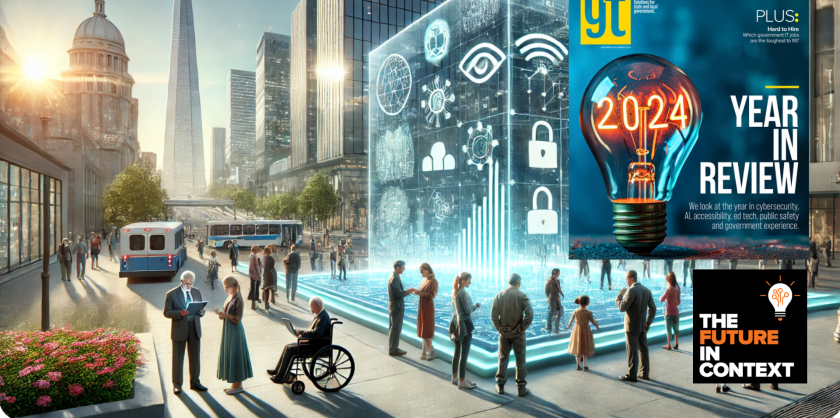The Future in Context
In a pivotal year, governments enacted AI laws, strengthened defenses, bridged the broadband gap, and prioritized accessible, user-friendly digital services. As 2025 nears, most jurisdictions still lack fully mature AI frameworks.
Future in Context
Sober reflections for presidential aspirants.
Perhaps best remembered for the dam and institute named for him, the 31st president was known as a great humanitarian but had a low view of the role of government in improving people's lives.
The hands of the Doomsday Clock now stand at 90 seconds to midnight — the closest to global nuclear catastrophe it has ever been. Against that backdrop, the United States still struggles with its own nuclear history.
The origins of the sixth president’s pathetic quest for greatness and his sacrifice of happiness during a lifetime of service.
The public expects better from the highest court in the land and has lost trust in the judicial branch as much as the others. Our resident humanities scholar asks, who will save us from our guardians?
America’s intervention in the Russo-Japanese War a century ago cast Theodore Roosevelt as an unlikely but ultimately successful diplomat. Teddy would be surprised to see who is leading the diplomatic offensive this time.
The fifth president is best known for the doctrine named for him that helped keep European powers from further meddling in the New World. And given the political environment today, you would be excused for being envious of his Era of Good Feeling.
What we can learn from the tragedy and now vindication of the father of the atomic bomb.
The current detention of a young Wall Street Journal correspondent echoes a high-stakes game played by governments that dates back to the American Revolution.
Catholic Church doctrine was used to justify the world’s largest land grab and the resulting colonialism. It had an outsized role in shaping the United States and other countries of the New World.
A statue long considered a Renaissance masterpiece in Florence (and the world over) has now been deemed pornographic in Florida. Such a stark contrast in points of view — here or there — has a long history.
The forgotten legacy of President Benjamin Harrison, who paved the way for Teddy Roosevelt. His tenure was marked by a mix of contributions to civil rights and conservation even while making a naked grab on Indigenous land.
Our resident humanities scholar laments that we thought we were immune to the human condition. We were wrong.
The idea of secession did not originate with Marjorie Taylor Greene. It has been tried before. The question we need to ask is whether we are really ready to see what a Red and Blue America would look and act like.
Seared in America’s collective memory and pilloried in popular culture, Jimmy Carter delivered a speech 44 years ago that chose to tell the American people the truth, rather than sing the Song of America.
From the White House tennis courts to the Camp David peace accords, along with an energy crisis and a hostage standoff, Jimmy Carter had a singular vision of how things should work.
Things that go beep beep beep in the night are generating more heat than light. They always have. But history suggests that a little panic can be a catalyst for positive public policy changes.
Tuesday’s speech was in keeping with a tradition dating back to the republic’s founding, including an increasing element of ‘bread and circuses,’ a mix of political policies and entertainment, ceremony and spectacle, in service of endless campaigning by both parties.
With Joe Biden delivering his third State of the Union address this week, our resident humanities scholar set out to make sense of the American presidency. Each president campaigned and governed to suit their respective times with a mix of shared and unique traits.
What do you do when you feel trapped by family lineage? Prince Harry of Britain chose a scorched earth approach. A century ago, a sharp-tongued daughter of American royalty known as Princess Alice blazed a different path.
America’s incoherent immigration policy is caught between the competing instincts of “give me … your huddled masses” and “build that wall.”
As a country, we don’t remember what happened 222 years ago, because we tend not to remember history. But also because that political storm “rolled harmlessly away.” Will we be as lucky?
The excesses of the American dream fill 50,000 storage facilities across the country. This material overflow results from crisis, indecision, laziness and selective forgetfulness.
With his unprecedented call for the termination of the U.S. Constitution, Donald Trump seems to ignore the lesson of Andrew Jackson, another aggrieved presidential aspirant who lived to fight – and win – another election.
Born of opportunities created in the aftermath of the Civil War, modern day carpetbaggers are simply opportunistic — and voters no longer seem to care anymore about unrooted candidates.
Former presidents have managed to talk their way out of trouble, even if by the skin of their teeth. There may be a lesson in that for us today.
In the 19th and 20th centuries, more than a dozen states enacted legislation barring Asians from purchasing property. But immigrants and their families used the court system and legal loopholes to fight back.
Museums are the institutional embodiment of the historical practice that to the victor go the spoils. More recently, the return of select artifacts is intended to set things right, but it’s complicated.
Bans are an illiberal idea that undermines a long and honorable tradition of making knowledge and ideas widely available, making people free to choose what to read for themselves.
There are few experiences that connect modern travelers to America’s past than on a train. Our resident humanities scholar recounts his journey west in preparation to tell the story of the man called both "The Empire Builder" and "The Devil's Curse."
About This Podcast
Most Read





























